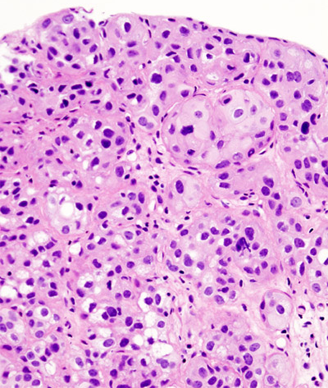Bladder-Sparing Therapy Recommended for Near-Complete Responders
A new study found that induction bladder-conserving treatment was safe in patients with muscle-invasive bladder cancer who achieved only a near-complete response.
Urothelial carcinoma of the urinary bladder; source: KGH, Wikimedia Commons

Patients with muscle-invasive bladder cancer who achieved only a near-complete response after induction bladder-conserving treatment had no increased incidence of bladder recurrence or salvage cystectomy upon cystoscopic evaluation when compared to those patients who achieved a complete response, according to newly presented data.
“Therefore, we recommend that patients with a near-complete response to the induction phase continue with bladder sparing therapy,” said presenting author Timur Mitin, MD, PhD, of Massachusetts General Hospital, at the 2014 ASCO Genitourinary Cancers Symposium.
The standard of care for patients with muscle-invasive bladder cancer is transurethral resection and concurrent chemoradiation given in two phases. After the induction phase of chemoradiation to 40 Gy, tumor response is assessed by cystoscopic biopsy. If the patient has persistent disease, early salvage cystectomy is offered; whereas, responders continue to consolidation chemoradiation to 64 Gy.
Unlike what is typically seen with standard of care, two recent Radiation Therapy Oncology Group trials (9906 and 0233) allowed patients with near-complete response to proceed with consolidation chemoradiation. Mitin and colleagues performed a pooled analysis of 119 patients in these trials to analyze if there are differences in bladder recurrence, salvage cystectomy rates, and survival in patients who achieved a complete response (T0) after the induction phase and those with near-complete (TA or Tis) response.
Bladder recurrence occurred among 35.6% of complete responders compared with 27.8% of near-complete responders, a nonsignificant difference. Incidence of invasive bladder recurrence was also similar between the two groups with 14 complete responders (36.1%) requiring late salvage cystectomy and one near-complete responder (20%) requiring the procedure.
At a median follow-up of 5.9 years, no difference in the 5-year overall survival was seen between patients who achieved complete response and those who achieved near-complete response (72% vs 61%). Additionally, no statistically significant difference in disease-specific survival and bladder-intact survival was seen, Mitin said.